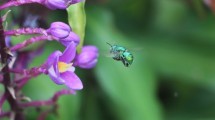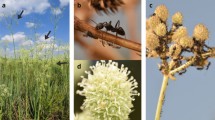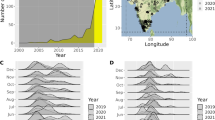Abstract
Non-parasitic bees differ in the degree of their taxonomic specialisation for pollen collection to feed their brood. Surveys of published data on pollen specialisation by bees of central Europe showed that about two-thirds of species are pollen generalists (polylectic) while the remainder only collect pollen of one family, genus or species (monolectic and oligolectic). Proportions of monolectic and oligolectic species among bee families and genera in central Europe varies widely, from the entirely pollen-specialised but small family Melittidae, to the mostly polylectic Halictidae and Apidae. The Asteraceae plant family attracts the most monolectic and oligolectic species, followed by Fabaceae, Brassicaceae and Campanulaceae. Several plant families in central Europe host only a single bee species. Of the species included in the Red List of bees of Czechia, oligoleges are proportionally more strongly represented than polyleges. Most of these red-listed oligoleges are associated with specific and regionally endangered habitats, i.e. steppes or wetlands. Most of the bees are more limited by the presence of their habitat or nesting site than by the host plant, although this fact is not simple to evaluate due to the incomplete data on the floral relations and distribution of bee species.






Similar content being viewed by others
References
Banaszak J, Romasenko L (1998) Megachilid bees of Europe (Hymenoptera, Apoidea, Megachilidae). Pedagogical University of Bydgoszcz, Bydgoszcz
Bassin L, Alvarez N, Pellissier L, Triponez Y (2011) Ecological niche overlap in sister species: how do oil-collecting bees Macropis europaea and M. fulvipes (Hymenoptera: Melittidae) avoid competition and hybridization? Apidologie 42:579–595. https://doi.org/10.1007/s13592-011-0067-z
Becher MA, Osborne JL, Thorbek P, Kennedy PJ, Grimm V (2013) Towards a systems approach for understanding honeybee decline: a stocktaking and synthesis of existing models. J Appl Ecol 50:868–880. https://doi.org/10.1111/1365-2664.12112
Bell KL, de Vere N, Keller A, Richardson RT, Gous A, Burgess KS, Brosi BJ (2016) Pollen DNA barcoding: current applications and future prospects. Genome 59:629–640. https://doi.org/10.1139/gen-2015-0200
Biesmeijer JC, Roberts SPM, Reemer M, Ohlemüller R, Edwards M, Peeters T, Schaffers AP, Potts SG, Kleukers R, Thomas CD, Settele J, Kunin WE (2006) Parallel declines in pollinators and insect-pollinated plants in Britain and the Netherlands. Science 313(5785):351–354. https://doi.org/10.1126/science.1127863
Bischoff I, Feltgen K, Breckner D (2003) Foraging strategy and pollen preferences of Andrena vaga (Panzer) and Colletes cunicularius (L.) (Hymenoptera: Apidae). J Hym Res 12:220–237
Bogusch P (2005) Biology of the cleptoparasitic bee Epeoloides coecutiens (Fabricius, 1775) (Hymenoptera: Apidae, Osirini). J Kans Entomol Soc 78:1–12. https://doi.org/10.2317/0310.16.1
Bogusch P, Bělastová L, Heneberg P (2017) Limited overlap of the community of bees and wasps (Hymenoptera: Aculeata) nesting in reed galls with those nesting in other cavities. J Ins Conserv 21:861–871. https://doi.org/10.1007/s10841-017-0025-9
Bogusch P, Hlaváčková L, Šilhán K, Horsák M (2020) Long-term changes of steppe-associated wild bees differ between shell-nesting and ground-nesting species. J Ins Conserv 24:513–523. https://doi.org/10.1007/s10841-020-00232-4
Bogusch P, Straka J, Kment P (2007) Annotated checklist of the Aculeata (Hymenoptera) of the Czech Republic and Slovakia. Komentovaný seznam žahadlových blanokřídlých (Hymenoptera: Aculeata) České republiky a Slovenska. Acta Entomol Mus Nat Pragae, Supplementum 11:1–300
Bogusch P, Van Achterberg C, Šilhán K, Astapenková A, Heneberg P (2018) Description of mature larvae and ecological notes on Gasteruption Latreille (Hymenoptera, Evanioidea, Gasteruptiidae) parasitizing hymenopterans nesting in reed galls. J Hym Res 65(14):1–21. https://doi.org/10.3897/jhr.65.26645
Bosch J, Sgolastra F, Kemp WP (2008) Life cycle ecophysiology of Osmia mason bees used as crop pollinators. In: James RR, Pitts-Singer TL (eds) Bee pollination in agricultural ecosystems. Oxford University Press, Oxford UK, pp 83–104
Bosch J, Martín González AM, Rodrigo A, Navarro D (2009) Plant-pollinator networks: adding the pollinator’s perspective. Ecol Lett 12:409–419. https://doi.org/10.1111/j.1461-0248.2009.01296.x
Brittain CA, Vighib M, Bommarcoc R, Settele J, Potts SG (2010) Impacts of a pesticide on pollinator species richness at different spatial scales. Bas Appl Ecol 11:106–115. https://doi.org/10.1016/j.baae.2009.11.007
Brosi BJ, Briggs HM (2013) Single pollinator species losses reduce floral fidelity and plant reproductive function. PNAS 110:13044–13048. https://doi.org/10.1073/pnas.1307438110
Cane JH (2020) A brief review of monolecty in bees and benefits of a broadened definition. Apidologie. https://doi.org/10.1007/s13592-020-00785-y
Cane JH, Sipes SD (2006) Characterizing floral specialization by bees: analytical methods and a revised lexicon for oligolecty. In: Waser NM, Ollerton J (eds) Plant-pollinator interactions: from specialization to generalization. The University of Chicago Press, Chicago and London, pp 99–122
Celary W (2004) A comparative study on the biology of Macropis fulvipes (Fabricius, 1804) and Macropis europaea Warncke, 1973 (Hymenoptera: Apoidea: Melittidae). Folia Biol-Krakow 52:81–85
Cizek L, Hauck D, Pokluda P (2012) Contrasting needs of grassland dwellers: habitat preferences of endangered steppe beetles (Coleoptera). J Ins Conserv 16:281–293. https://doi.org/10.1007/s10841-011-9415-6
Cross I, Notton DG (2017) Small-headed resin bee, Heriades rubicola, new to Britain (Hymenoptera: Megachilidae). Br J Entomol Nat Hist 30:1–6
Danforth BN, Minckley RL, Neff JL (2019) The solitary bees: biology, evolution, conservation. Princeton University Press, Princeton
Deák B, Tóthmérész B, Valkó O, Sudnik-Wójcikowska B, Moysiyenko II, Bragina TM, Apostolova I et al (2016) Cultural monuments and nature conservation: a review of the role of kurgans in the conservation and restoration of steppe vegetation. Biodiv Conserv 25:2473–2490. https://doi.org/10.1007/s10531-016-1081-2
Dötterl S, Vereecken NJ (2010) The chemical ecology and evolution of bee flower interactions: a review and perspectives. Canad J Zool 88:668–697. https://doi.org/10.1139/Z10-031
Else GR, Edwards M (2018) Handbook of the bees of the British Isles, vol 1 and 2. Ray Society, London
Friese H (1923) Die europäischen Bienen (Apidae) Das Leben und Wirken unserer Blumenwespen. de Gruyter & Co., Berlin and Leipzig
Goulson D, Nicholls R, Botías C, Rotheray EL (2015) Bee declines driven by combined stress from parasites, pesticides, and lack of flowers. Science 347(6229):1255957. https://doi.org/10.1126/science.1255957
Grulich V, Chobot K (2017) Červený seznam ohrožených druhů České republiky. Cévnaté rostliny. [Red List of endangered species of the Czech Republic. Vascular Plants]. Příroda 35:1–178 ((in Czech))
Habermannová J, Bogusch P, Straka J (2013) Flexible host choice and common host switches in the evolution of generalist and specialist cuckoo bees (Anthophila: Sphecodes). PlosONE 8(5):e64537. https://doi.org/10.1371/journal.pone.0064537
Haider M, Dorn S, Sedivy C, Müller A (2014) Phylogeny and floral hosts of a predominantly pollen generalist group of mason bees (Megachilidae, Osmiini). Biol J Linn Soc 111:78–91. https://doi.org/10.1111/bij.12186
Hallett AC, Mitchell RJ, Chamberlain ER, Karron JD (2017) Pollination success following loss of a frequent pollinator: the role of compensatory visitation by other effective pollinators. AoB Plants 9(3):20. https://doi.org/10.1093/aobpla/plx020
Heneberg P, Bogusch P (2014) To enrich or not to enrich? Are there any benefits of using multiple colors of pan traps when sampling aculeate Hymenoptera? J Insect Conserv 18:1123–1136. https://doi.org/10.1007/s10841-014-9723-8
Henry M, Béguin M, Requier F, Rollin O, Odoux J-F, Aupinel P, Aptel J, Tchamitchian S, Decourtye AA (2012) A common pesticide decreases foraging success and survival in honeybees. Science 336:348–350. https://doi.org/10.1126/science.1215039
Isenring R (2010) Pesticides and the loss of biodiversity. How intensive pesticide use affects wildlife populations and species diversity. Pesticide Action Ring Europe, London
Klein AM, Vassiere BE, Cane JH, Steffan-Dewenter I, Cunningham S, Kremen C et al (2007) Importance of pollinators in changing landscapes for world crops. Proc Royal Soc Lond B 274:303–313. https://doi.org/10.1098/rspb.2006.3721
Kocourek M (1966) Prodromus der Hymenopteren der Tschechoslowakei. Pars 9—Apoidea—Andrena. Acta Faun Entomol Mus Nat Pragae 12(2):1–122
Kovács-Hostyánszki A, Földesi R, Báldi A, Endrédi A, Jordán F (2019) The vulnerability of plant-pollinator communities to honeybee decline: a comparative network analysis in different habitat types. Ecol Indic 97:35–50. https://doi.org/10.1126/science.1215039
Kuhlmann M, Ascher JS, Dathe HH, Ebmer AW, Hartmann P, Michez D et al. (2019) Checklist of the Western Palaearctic Bees (Hymenoptera: Apoidea: Anthophila). https://westpalbees.myspecies.info. Accessed 12 August 2019
Macek J, Straka J, Bogusch P, Dvořák L, Bezděčka P, Tyrner P (2010) Blanokřídlí České republiky I. Žahadloví. Academia, Praha
Michez D, Patiny S, Rasmont P, Timmermann K, Vereecken NJ (2008) Phylogeny and host-plant evolution in Melittidae s.l. (Hymenoptera: Apoidea). Apidologie 39:146–162. https://doi.org/10.1051/apido:2007048
Mommaerts V, Put K, Smagghe G (2011) Bombus terrestris as pollinator-and-vector to suppress Botrytis cinerea in greenhouse strawberry. Pest Sci 67:1069–1075. https://doi.org/10.1002/ps.2147
Müller A (1996) Host-plant specialization in western palearctic anthidine bees (Hymenoptera: Apoidea: Megachilidae). Ecol Monogr 66:235–257. https://doi.org/10.2307/2963476
Müller A (2018) Pollen host selection by predominantly alpine bee species of the genera Andrena, Panurginus, Dufourea, Megachile, Hoplitis and Osmia (Hymenoptera, Apoidea). Alpine Entomol 2:101–113. https://doi.org/10.3897/alpento.2.29250
Müller A, Kuhlmann M (2008) Pollen hosts of western palaearctic bees of the genus Colletes (Hymenoptera: Colletidae): the Asteraceae paradox. Biol J Linn Soc 95:719–733. https://doi.org/10.1111/j.1095-8312.2008.01113.x
Nieto A, Roberts SPM, Kemp J, Rasmont P, Kuhlmann M, García Criado M et al (2014) European red list of bees. Publication Office of the European Union, Brussels
Patiny S, Michez D, Danforth BN (2008) Phylogenetic relationships and host-plant evolution within the basal clade of Halictidae (Hymenoptera, Apoidea). Cladistics 24:255–269. https://doi.org/10.1111/j.1096-0031.2007.00182.x
Pesenko YA, Banaszak J, Radchenko VG, Cierzniak T (2000) Bees of the family Halictidae (excluding sphecodes) of Poland: taxonomy, ecology, bionomics. Bydgoszcz Press, Bydgoszcz, Poland, Bydgoszcz
Pitts-Singer TL, Cane JH (2011) The Alfalfa Leafcutting Bee, Megachile rotundata: the world’s most intensively managed solitary bee. Ann Rev Entomol 56:221–237. https://doi.org/10.1146/annurev-ento-120709-144836
Pornon A, Escaravage N, Burrus M, Holota H, Khimoun A, Mariette J, Pellizzari C, Iribar A, Etienne R (2016) Using metabarcoding to reveal and quantify plant-pollinator interactions. Sci Rep 6:27282. https://doi.org/10.1038/srep27282
Potts SG, Biesmeijer JC, Kremen C, Neumann P, Schweiger O, Kunin WE (2010) Global pollinator declines: trends, impacts and drivers. Trends Ecol Evol 25:345–353. https://doi.org/10.1016/j.tree.2010.01.007
Ptáček V (1988) Rhophitoides canus Ev.—the bee that survives modern farming. In: Anonym: EUCARPIA (Medicago sativa) working group meeting, Radzików, pp 44–45
Rasmont P, Devalez J, Pauly A, Michez D, Radchenko V (2017) Addition to the checklist of IUCN European wild bees (Hymenoptera: Apoidea). Ann Soc Entomol France 53(1):17–32. https://doi.org/10.1080/00379271.2017.1307696
Rasmont P, Franzén M, Lecocq T, Harpke A, Roberts SPM, Biesmeijer JC et al (2015) Climatic risk and distribution atlas of European Bumblebees. Biorisk 10:1–246
Robertson C (1925) Heterotrophic bees. Ecology 6:412–436. https://doi.org/10.2307/1929107
Roswell M, Dushoff J, Winfree R (2019) Male and female bees show large differences in floral preference. PLoS ONE 14(4):e0214909. https://doi.org/10.1371/journal.pone.0214909
Scheuchl E, Willner M (2016) Taschenlexikon der Wildbienen Mitteleuropas: Alle Arten im Porträt. Quelle & Meyer, Leipzig
Sedivy C, Dorn S, Widmer A, Müller A (2013) Host range evolution in a selected group of osmiine bees (Hymenoptera: Megachilidae): the Boraginaceae-Fabaceae paradox. Biol J Linn Soc 108:35–54. https://doi.org/10.1111/j.1095-8312.2012.02013.x
Sedivy C, Müller A, Dorn S (2011) Closely related pollen generalist bees differ in their ability to develop on the same pollen diet: evidence for physiological adaptations to digest pollen. Funct Ecol 25:718–725. https://doi.org/10.1111/j.1365-2435.2010.01828.x
Sedivy C, Praz C, Müller A, Widmer A, Dorn S (2008) Patterns of host-plant choice in bees of the genus chelostoma: the constraint hypothesis of host-range evolution in bees. Evolution 62(10):487–507. https://doi.org/10.1111/j.1558-5646.2008.00465.x
Straka J, Bogusch P (2017) Apiformes (včely). pp. 236–249. In: Hejda R, Farkač J, Chobot K (eds) Červený seznam ohrožených druhů České republiky. Bezobratlí. Red List of Invertebrates of the Czech Republic. Příroda 36: 1–612.
Torchio PF, Asensio E (1985) The Introduction of the European Bee, Osmia cornuta Latr., into the U.S. as a potential pollinator of orchard crops, and a comparison of its manageability with Osmia lignaria propinqua Cresson (Hymenoptera: Megachilidae). J Kans Entomol Soc 58:42–52
Vanderplanck M, Zerck PL, Lognay G, Michez D (2019) Generalized host-plant feeding can hide sterol-specialized foraging behaviors in bee–plant interactions. Ecol Lett. https://doi.org/10.1002/ece3.5868
Vicens N, Bosch J (2000) Pollinating efficacy of Osmia cornuta and Apis mellifera (Hymenoptera: Megachilidae, Apidae) on ‘Red Delicious’ Apple. Environ Entomol 29:235–240. https://doi.org/10.1093/ee/29.2.235
Watanabe ME (1994) Pollination worries rise as honey bees decline. Science 265(5176):1170. https://doi.org/10.1126/science.265.5176.1170
Westerfelt P, Weslien J, Widenfalk O (2018) Population patterns in relation to food and nesting resource for two cavity-nesting bee species in young boreal forest stands. For Ecol Manag 430:629–638. https://doi.org/10.1016/j.foreco.2018.08.053
Westrich P (1989) Die Wildbienen Baden-Württembergs. Ulmer, Stuttgart
Westrich P (2018) Die Wildbienen Deutschlands. Eugen Ulmer, Stuttgart
Wood TJ, Michez D, Paxton RJ, Drossart M, Neumann P, Gérard M, Vanderplanck M, Barraud A, Martinet B, Leclercq N, Vereecken NJ (2020) Managed honey bees as a radar for wild bee decline? Apidologie. https://doi.org/10.1007/s13592-020-00788-9
Zurbuchen A, Landert L, Klaiber J, Müller A, Hein S, Dorn S (2010) Maximum foraging ranges in solitary bees: only few individuals have the capability to cover long foraging distances. Biol Conserv 143:669–676. https://doi.org/10.1016/j.biocon.2009.12.003
Zurbuchen A, Müller A (2012) Wildbienenschutz-von der Wissenschaft zur Praxis. Haupt Verlag, Bern
Acknowledgements
We would like to thank to the reviewers for very helpful comments. Lucy Boulton (Lincoln, UK) and Radek Blatný (Prague, Czech Republic) corrected the English. Alena Astapenková (Hradec Králové, Czech Republic) helped with the first steps of this study. This survey was supported by the Specific Research Grant from Univerzita Hradec Králové Nr. 2102/2020.
Author information
Authors and Affiliations
Corresponding author
Additional information
Communicated by Christina Mogren and Heikki Hokkanen.
Publisher's Note
Springer Nature remains neutral with regard to jurisdictional claims in published maps and institutional affiliations.
Electronic supplementary material
Below is the link to the electronic supplementary material.
Rights and permissions
About this article
Cite this article
Bogusch, P., Bláhová, E. & Horák, J. Pollen specialists are more endangered than non-specialised bees even though they collect pollen on flowers of non-endangered plants. Arthropod-Plant Interactions 14, 759–769 (2020). https://doi.org/10.1007/s11829-020-09789-y
Received:
Accepted:
Published:
Issue Date:
DOI: https://doi.org/10.1007/s11829-020-09789-y




